The Festival’s Focus and Structure
The festival’s executive producers Lori Steinberg and Jim Steinberg (also the founder) and artistic director Andrew Leynse have created an environment where participants are encouraged to cultivate their work at any stage of development. During the one-week residency, they provide the teams with resources needed to help them on their development journeys. Time is allocated in the schedule for the writers to write, so rehearsals often don’t begin until the afternoon, and teams can employ the work time however they deem useful. After the week, over the weekend, teams showcase a portion of their work or the work in its entirety for each other, a public audience of primarily locals from Steamboat Springs, as well as some ardent playwright enthusiasts who are supporters of the festival from around the country.
Leynse and the Steinbergs reinforce in their producing practice that the focus is on the playwright’s process, and while the festival is there to help the writers achieve their goals, there is an understanding that they can change those goals over the course of the week as the work develops.
The Artists and Institutions’ Experiences
Associate artistic director of South Coast Repertory, John Glore, who accompanied and dramaturged Caroline V. McGraw’s I Get Restless workshop this past summer (which South Coast will produce in April 2020), talked of the experience as a hybrid between a play development site and a summer camp. “You’re hanging out with, having all your meals with, and sharing condos with the other members of your artistic team,” he said. “It is really conducive to building trust and friendship and things that always make a process better.”
Director Les Waters, who has participated three times in the festival—most recently this past year with the Public Theater, directing the musical Black Mountain Women, composed by Martha Redbone and Aaron Whitby, with book by Naomi Iizuka—has also appreciated what it offers. Waters fondly describes the first time he attended, workshopping Chuck Mee’s play Glory of the World for Actors Theatre of Louisville. The company would voluntarily get up at 4 am and listen to the environment, a practice inspired by Thomas Merton’s essay Rain and the Rhinoceros. According to Waters, this ultimately helped to shape “the top and the tail of the piece.” He and all the teams he has worked with over the years have appreciated the idyllic environment, as it has provided them the time and inspiration to collaborate.
Leynse and the Steinbergs reinforce in their producing practice that the focus is on the playwright’s process.
Experiencing something radically different, Madhuri Shekar, who participated in the festival in 2018 on her commission from Victory Gardens Theater titled Miriam, spent most of her time writing in her condo, working closely with the company’s artistic director—and her weeklong housemate—Chay Yew. She enthusiastically said that when she arrived, she had zero pages, but at the end of her time she had forty. (Although Shekar accomplished a lot of work on Miriam, she ultimately wrote a different play for her commission, titled Dhaba on Devon Avenue, which Victory Gardens will produce this season.)
Since 2017, Denver’s Curious Theatre Company has brought pieces to the festival, beginning with Emily Dendinger’s #GodHatesYou. Curious has a focus on new plays, and both the artistic director Chip Walton and the education director/co–artistic collaborator Dee Covington attest their theatre lacks the same resources for new play development as somewhere like the Denver Center for the Performing Arts, so opportunities like the Colorado New Play Festival are invaluable. Walton also stated that he has often observed, in the field at large, an adversarial relationship between a playwright and producing organization. But the Colorado New Play Festival attempts to strengthen these relationships by bringing artists and representatives of institutions together over the work and through socializing, as well as by fostering teamwork with the individual groups’ collaborations.
Qualities of the Festival and Showcase
The Steamboat Springs environment truly lends itself well to creating relationships and having exchanges with other artists. In good part due to the seclusion created by the Rocky Mountains, the artistic teams are removed from the obligations of the industry. It takes effort to get to Steamboat Springs—you need to fly to Denver and drive three to four hours, or fly into the regional airport in Hayden, forty minutes away. But the program is not as isolated as somewhere like Sundance Theatre Lab, where the public or external industry members have no access.
The festival producers strongly feel it’s important to expose the local audience to work that will eventually be seen around the nation, so they open rehearsals to the public. A few observers—supporters and donors of the festival—also travel from out of town to experience the entire week of rehearsals and presentations. To prevent observers from being intrusive and encumbering the artistic processes, the festival staff is always in conversation with the playwrights and their teams, to understand their needs.
The Steamboat Springs environment truly lends itself well to creating relationships and having exchanges with other artists.
Some artists may feel trepidation when it comes to sharing their work in the very early stages of development. But Glore described how they are sharing, for the most part, with fellow artists they either knew already or have gotten to know over the week. “Colleagues will have a sense of where each other is in the process,” Glore said. “The goal is to be supportive and not hypercritical, so it feels less exposing than in some other new play development forums.” And the public audience is genuinely enthusiastic about the festival’s presence and the cornucopia of work.
Leynse said the festival has never had issues meeting audience expectations with the presentations. I can attest to that. In 2018, when I was there, Lucas Hnath workshopped a very early rendering of The Thin Place with director Waters, which was commissioned by and premiered at the Humana Festival at Actors Theatre of Louisville and is now playing at Playwrights Horizons. For their presentation, Waters gave a brief introduction and then three actors read monologues from the play. In observing the audience—both artists and Coloradans—were intoxicated by what they experienced; there was insatiable desire for more.
The Play Lab Conference
The Play Lab Conference, which has existed for two years, is a daylong discussion after the presentations. Functioning separately from the festival, the conference involves non-producing new work development organizations in the United States and centers around institutional issues as artist-centered organizations. Attendees include artistic directors, producers, artistic and literary leadership, managing directors, executive directors, and board members.
At the 2019 convening, representatives from the following organizations participated: SPACE on Ryder Farm, National Winter Playwrights Retreat, Colorado New Play Festival, National New Play Network, Playwrights Foundation, New Dramatists, PlayPenn, Playwrights’ Center, the New Harmony Project, Seven Devils Playwrights Conference, and the Lark. Topics spanned how development institutions don’t always receive credit from producing institutions for the work they have cultivated, to the trend of writers workshopping their plays at multiple development sites with different collaborators over a short timespan, to how companies are spending more and more time on fundraising than any other institutional responsibility.
One of the many participants of the conference this year, Emily Morse, the artistic director of New York City’s New Dramatists, described the national ecosystem of new play development institutions, wherein each organization has different goals, serves different artists, and has different structures in place to meet these deliverables. For example, New Dramatists is a playwright-driven organization, while Philadelphia’s PlayPenn is a project-driven organization that supports playwrights. Morse contends the work of all these organizations is complimentary and many of them, especially regionally, are in consistent conversation. But she also noted there’s an assumption that every organization knows what the others do, which isn’t necessarily true. She hopes that queries like: “What does cultural mapping look like in this room? What are the benefits of knowing a little more? Are there partnership potentials?” will continue to be raised and discussed.
The Colorado New Play Festival has a history of providing support for over a hundred plays and musicals, as well as being a site for discourse for key new play development institutions.
Both Morse and Emily Simoness, the executive director of SPACE on Ryder Farm, an artist residency in Putnam County, New York and another participant of the conference, acknowledged the “glaring lack of ethnic and racial diversity in the room.” In a follow-up discussion I had with Simoness, she said, “It was a very homogeneous group of predominantly white people talking about issues of equity, diversity, and inclusion. That presents real challenges. How do you truly address these issues in ways that are responsible?”
Another topic that came up was the influence the TV and film industry has on new play development. Simoness feels it’s a “net-positive,” particularly for playwrights, but it makes scheduling for programs, like hers, very difficult. Participants acknowledged how they are approached by the TV and film industry more and more to provide their insights on particular artists’ work. Hayley Finn, the associate artistic director of Minneapolis’s Playwrights’ Center, describes playwrights who work in TV/film and theatre as “dual citizens” of both industries.
Reflecting on the overall conference experience, Finn said that although it’s valuable to be in conversation with colleagues at producing theatres, it’s also extremely valuable to have “an intense and focused time to really dive into issues about new play development, issues playwrights are facing currently, how we can collectively support these writers, and how we can get these stories out into the world.”
Artistic director of the Lark, John Clinton Eisner, concurred: he feels like the opportunity for development organizations to share their challenges and successes is always positive. Additionally, as there were members from producing organizations and foundations at the conference, he noted: “It’s really useful to have people who are part of the funding structure, commercial, and not-for-profit institutions listening into a conversation of development institutions because they can hear the issues that are at the center of our work and how it intersects with theirs.”

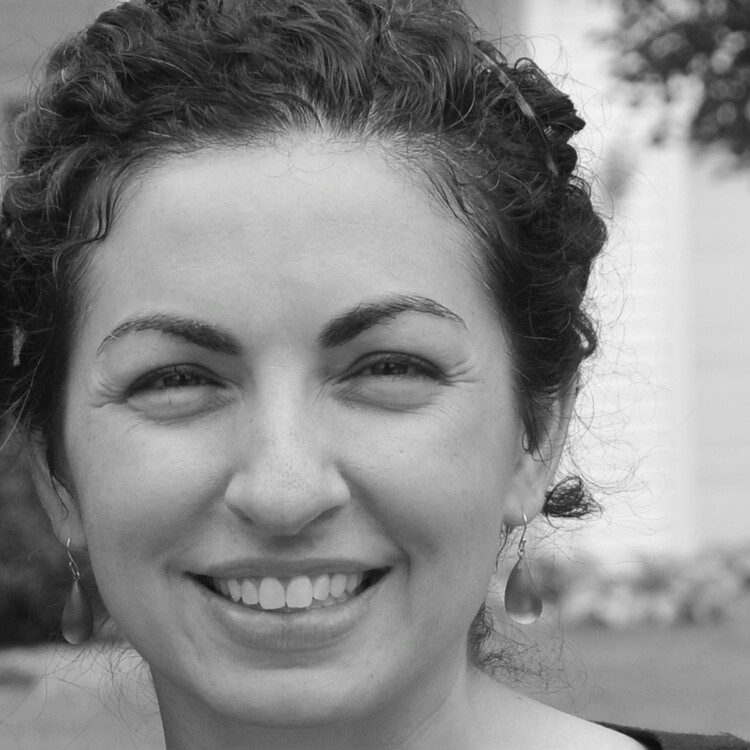
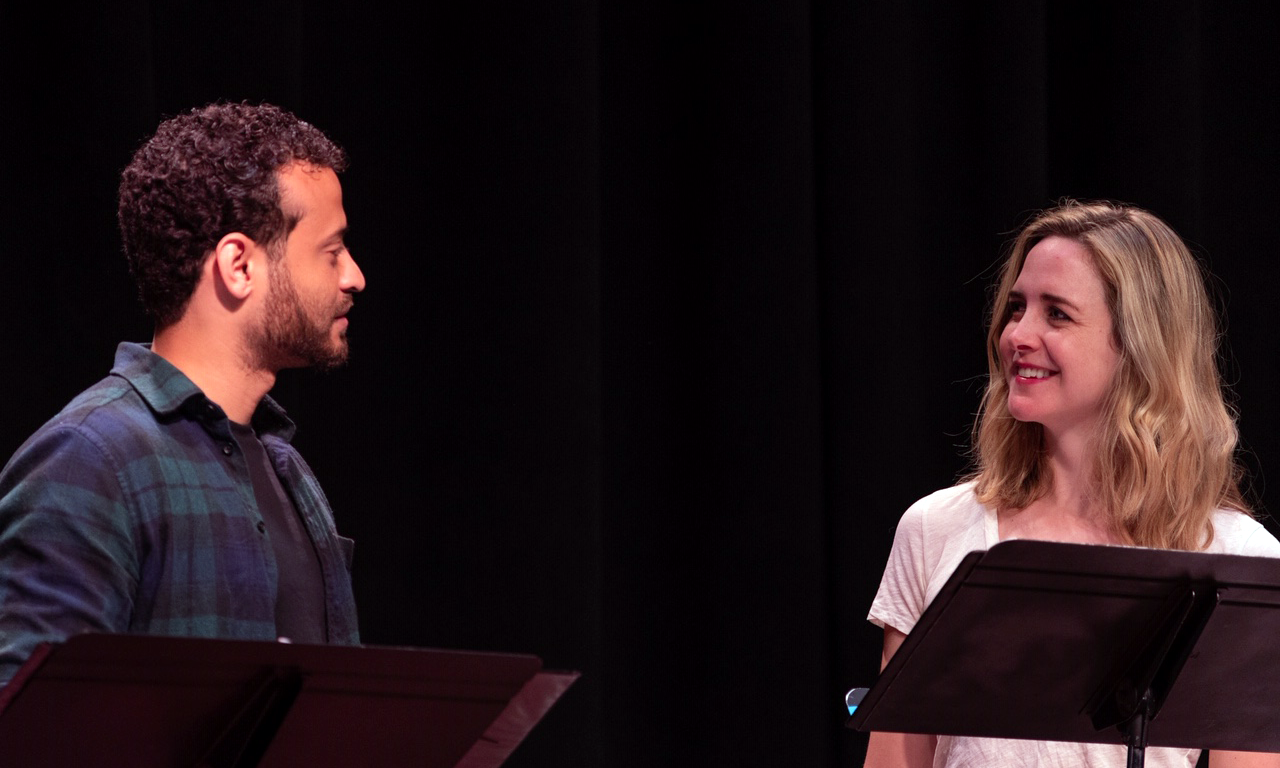
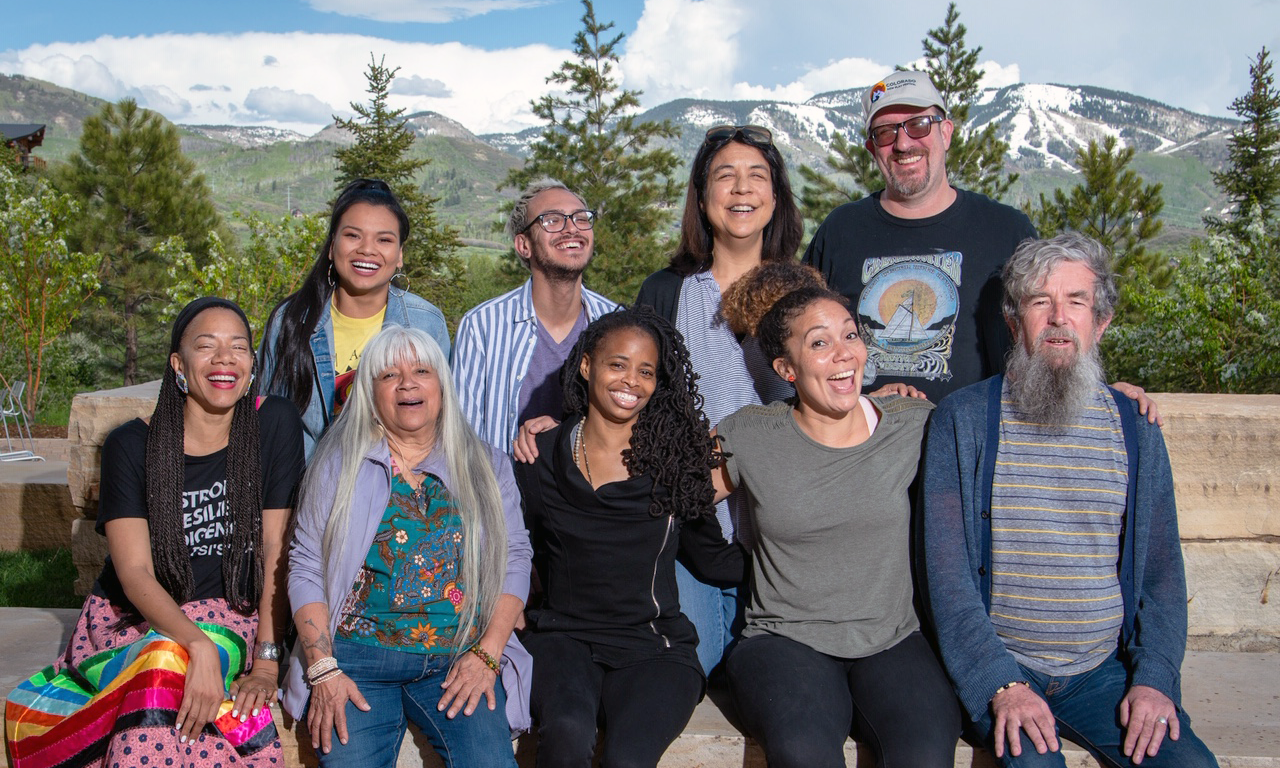
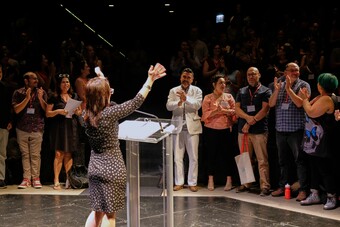

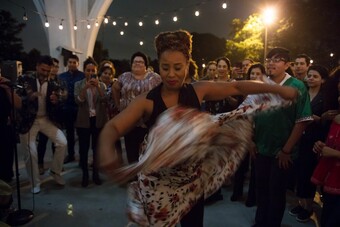

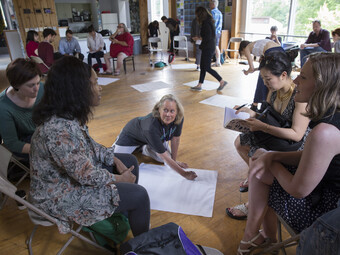

Comments
The article is just the start of the conversation—we want to know what you think about this subject, too! HowlRound is a space for knowledge-sharing, and we welcome spirited, thoughtful, and on-topic dialogue. Find our full comments policy here